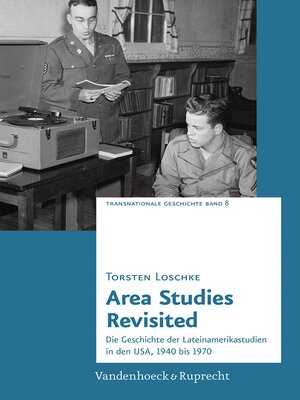Area Studies Revisited
ebook ∣ Die Geschichte der Lateinamerikastudien in den USA, 1940 bis 1970 · Transnationale Geschichte.
By Torsten Loschke

Sign up to save your library
With an OverDrive account, you can save your favorite libraries for at-a-glance information about availability. Find out more about OverDrive accounts.
Find this title in Libby, the library reading app by OverDrive.



Search for a digital library with this title
Title found at these libraries:
| Library Name | Distance |
|---|---|
| Loading... |
This book challenges the common notion of U.S. area studies as a powerful Cold War enterprise, created with massive help from philanthropic foundations as well as the government and exploited for strategic purposes of a superpower. Looking at the history of Latin American studies in the United States between the late 1930s and 1970s, the study focuses particularly on the role of funding policies, thereby developing an alternative narrative of the cycles and institutional development of area studies. The expansion of Latin American studies was characterized by a growing but fragile network of individual scholars, science managers, scholarly committees and university centers as well as funding agencies like the Rockefeller Foundation and the U.S. Office of Education, all of them trying to influence the fate of Latin American studies with their oftentimes conflicting political interests. Though foundations and government agencies pursued ambitious goals by funding area studies their influence was often severely limited by a lack of knowledge and resources, a frequent change of their funding priorities and not least by internal dynamics in universities. While the new concept of area studies became a powerful model for funding policies after 1945 Latin American studies programs were in fact characterized by a huge institutional variety and more often than not by a marginal and precarious position within their respective universities. Based on multi-archival research this book sheds new light on the history of area studies in the United States and thereby contributes to a more nuanced understanding of the study of world regions in an age of globalization.







